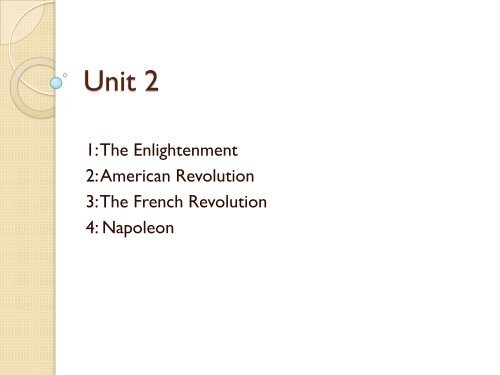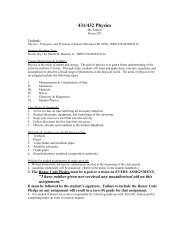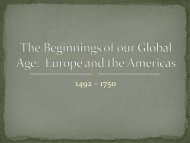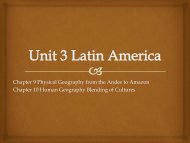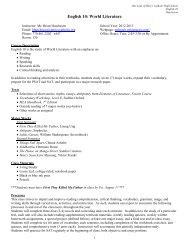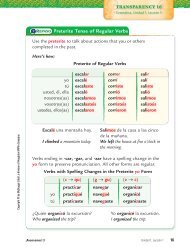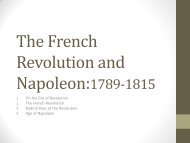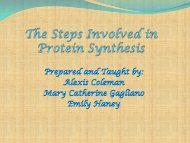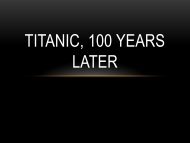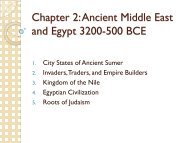Chapter 5: The Enlightenment and the American Revolution
Chapter 5: The Enlightenment and the American Revolution
Chapter 5: The Enlightenment and the American Revolution
Create successful ePaper yourself
Turn your PDF publications into a flip-book with our unique Google optimized e-Paper software.
1: <strong>The</strong> <strong>Enlightenment</strong>Essential Question: What effects did <strong>Enlightenment</strong>Philosophers have on government <strong>and</strong> society stilltoday?
Terms, People, <strong>and</strong> Places• Natural Law• Thomas Hobbes• John Locke• Social Contract• Natural Right• Philosophe• Montesquieu• Diderot• Rousseau
Natural Law• Rules discoverable by reason that governscientific forces◦ Gravity◦ Magnetism• Reformers thought <strong>the</strong>y could studyhuman behavior using <strong>the</strong> ScientificMethod• This thinking of <strong>the</strong> Scientific <strong>Revolution</strong>lead to <strong>the</strong> <strong>Enlightenment</strong>
Thomas Hobbes <strong>and</strong> John Locke• Two 17 th century English thinkers that setforth <strong>the</strong> ideas that were key to <strong>the</strong>enlightenment• Both lived through <strong>the</strong> terrors of <strong>the</strong>English civil war• However both had conflicting views of<strong>the</strong> world
Hobbes believed in a powerfulgovernment• If people are notgoverned <strong>the</strong>y wouldresort to violence• People entered into aSocial Contract that gaveup certain freedoms forsecurity• Believed <strong>the</strong> best formof government for thiswas a monarchy
Locke advocates natural rights• Thought people werereasonable <strong>and</strong> moral• Had certain “naturalrights”◦ Life, Liberty, <strong>and</strong> Property• Believed people formedgovernments to protectnatural rights <strong>and</strong>government• Best kind of governmentwas a limitedgovernment
<strong>The</strong> Philosophes• A group of <strong>Enlightenment</strong> thinkers inFrance that applied <strong>the</strong> methods ofscience to underst<strong>and</strong> <strong>and</strong> improvesociety◦ Baron de Montesquieu◦ Denis Diderot◦ Jean-Jacques Rousseau
Montesquieu Advances <strong>the</strong> idea ofSeparation of Powers• Criticized Absolute Monarchy• 1748 published <strong>The</strong> Spirit of <strong>the</strong> Lawswhich discussed <strong>the</strong> history ofgovernments• Thought government should be separatedin branches that can check <strong>and</strong> balanceeach o<strong>the</strong>r• Great influence on <strong>the</strong> formation of <strong>The</strong>United States government
Diderot edits <strong>the</strong> Encyclopedia• Worked for years <strong>the</strong> create 28 volumeof books called <strong>and</strong> Encyclopedia• Covered topics like government,philosophy <strong>and</strong> religion• Helped spread <strong>the</strong> ideas of <strong>The</strong><strong>Enlightenment</strong>
Rousseau Promotes <strong>the</strong> SocialContract• Like Locke felt all people were basicallygood• Felt society was corrupted by unequaldistribution of property• Wrote <strong>The</strong> Social Contract◦ Society placed too many limitations onbehavior◦ Some controls necessary◦ Freely elected government should imposecontrols
Writers Face Censorship• Most governments did not agree with <strong>the</strong>thoughts of <strong>the</strong> <strong>Enlightenment</strong>• Would often use censorship to control<strong>the</strong> spread of ideas◦ Banned books◦ Burned books◦ Imprisoned writers
Ways around Censorship• Writers would often disguise <strong>the</strong>ir worksas fiction• Montesquieu’s Persian Letters used totravelers tales to mock French Society
Ideas Spread in Salons• New Literature, arts, science <strong>and</strong>philosophy were regular topics ofdiscussion among <strong>the</strong> Enlightened• <strong>The</strong>y would ga<strong>the</strong>r in groups or Salonsfor <strong>the</strong>se discussions• All were invited middle class <strong>and</strong>Noblemen• This put <strong>the</strong> middle class <strong>and</strong> nobles onlevel with each o<strong>the</strong>r
Enlightened Despots Embrace NewIdeas• <strong>The</strong> ruling courts of Europe become filledwith philosophes trying to get <strong>the</strong>ir ideasaccepted by ruling class• Enlightened despots - rulers thataccepted <strong>the</strong> enlightened ideas◦ Frederick <strong>the</strong> Great◦ Ca<strong>the</strong>rine <strong>the</strong> Great◦ Joseph II
Frederick <strong>the</strong> Great of Prussia• Imposed tight control but saw himself as aservant of <strong>the</strong> state with a duty to workfor <strong>the</strong> common good• Reforms were directed to makegovernment more efficient• Practiced religious toleration stating “Inmy kingdom one can go to heaven onones own fashion.”
Ca<strong>the</strong>rine <strong>the</strong> Great of Russia• Had written correspondence withPhilosophes• Reforms included◦ Abolished torture◦ Granted religious tolerance• She also criticized serfdom
Joseph II of Austria• Son of Maria <strong>The</strong>resa• Most radicle of <strong>the</strong> Enlightened despots• Would dress as a commoner <strong>and</strong> travelamong <strong>the</strong> people• Allowed for religious toleration• Ended censorship in his country• Sold monasteries not involved incommunity service
Lives of <strong>the</strong> Majority Change Slowly• Most Europeans were un touched by <strong>the</strong>middle class• Made up of peasants• Eventually ideas of equality made <strong>the</strong>irways into <strong>the</strong> lives of <strong>the</strong> peasant class• Led to revolution on <strong>the</strong> continent by <strong>the</strong>late 1800’s
Essential Question:• What effects did <strong>Enlightenment</strong>Philosophers have on government <strong>and</strong>society still today?• Separation of Powers• Religious tolerance• Freely elected governments
3. Birth of <strong>the</strong> <strong>American</strong>RepublicEssential Question : Did we ever get no taxation without representation?
Terms, People, <strong>and</strong> Places• George III• Stamp Act• George Washington• Thomas Jefferson• Popular sovereignty• Yorktown, VA• Treaty of Paris• James Madison• Benjamin Franklin• Federal Republic
King George III• King of Engl<strong>and</strong>during <strong>the</strong> <strong>American</strong><strong>Revolution</strong>
<strong>The</strong> Colonies in <strong>the</strong> Mid 1700’s• Home to a diverse groupof people <strong>and</strong> socialdistinctions were blurred• Governed local affairs,appointed <strong>the</strong>ir ownrepresentatives,• were prosperous,• did not enforce Britishrule
Colonist Express Discontent• Seven Years’War/French IndianWar• 1765 Stamp Act• “No taxationwithoutrepresentation”
Colonist Rebel• A series of violentclashes betweencolonist <strong>and</strong> GreatBritain escalate◦ Boston Massacre◦ Boston Tea Party◦ Lexington <strong>and</strong>Concord
Drafting of <strong>the</strong> Declaration of Independence• 1775 <strong>Revolution</strong>ary War hasbegun• Leads <strong>the</strong> creation of aColonial army led by GeorgeWashington• Continental Congress met<strong>and</strong> declared independencefrom Great Britain 1776• Drafted <strong>The</strong> Declaration ofIndependence written byThomas Jefferson• <strong>The</strong> Declaration inspired byideas of John Locke
Locke's Idea’s Used• People had <strong>the</strong> right toalter or abolish unjustgovernments• Power comes from <strong>the</strong>people• Life Liberty <strong>and</strong> <strong>the</strong>Pursuit of Happiness
<strong>American</strong> <strong>Revolution</strong>• <strong>Revolution</strong>aries fightusing guerrilla warfare• Battle of Saratoga:<strong>American</strong> victoryconvinces France tosupport <strong>the</strong> revolution• France’s blockadeenables Washington todefeat <strong>the</strong> British atYorktown Virginia where<strong>the</strong>y surrender• Treaty of Paris ends <strong>the</strong>war, recognizes Americassovereignty
A New Constitution• Articles ofConfederation are notworking• 1787 Philadelphia torevise <strong>the</strong> Articles• end up scrapping <strong>the</strong>m<strong>and</strong> draftingconstitution uniting<strong>the</strong> states of America• Established agovernment of <strong>the</strong>people, by <strong>the</strong> people<strong>and</strong> for <strong>the</strong> people
<strong>Enlightenment</strong> Ideas have a great impact• Framers used <strong>the</strong> ideas of Locke,Montesquieu <strong>and</strong> Rousseau• “We <strong>the</strong> people of <strong>the</strong> United States”• Constitution provides for an electedgovernment• Creates a Federal Republic Power dividedbetween <strong>the</strong> Federal government <strong>and</strong> States• Allows for a system of Checks <strong>and</strong> Balances• Insures individual rights with <strong>the</strong> Bill ofRights
Essential Question• Did we ever get no taxation with outrepresentation?
<strong>The</strong> French <strong>Revolution</strong>• Essential Question:How was <strong>the</strong> Frenchrevolution <strong>the</strong> same asours? How was itdifferent?
French Society Divided• Before <strong>the</strong> revolution, France is ruled under anancien regime, or old order in which <strong>the</strong>country is divided into three classes• <strong>The</strong> three classes are called <strong>the</strong> Estate◦ <strong>The</strong> First estate is <strong>the</strong> Clergy◦ <strong>The</strong> Second Estate is <strong>the</strong> Nobility◦ <strong>The</strong> Third Estate is <strong>the</strong> Peasant Class
First EstateSecond Estate• Clergy• 1 % of population; had 10%of l<strong>and</strong>• Highest officials were verywealthy• Only paid a 2% “gift tax”• Titled nobility• 2% of Population• Nobles were granted topjobs• Paid little to no taxes<strong>The</strong> First <strong>and</strong> Second Estates
BourgeoisieLower Class• Vastly Diverse• -middle class lawyers,bankers, doctors, journalist,merchants• Philosophes• Salons• Birth of <strong>the</strong> <strong>Enlightenment</strong>• Working class• Unskilled labor• Peasant classThird Estate (two parts)
Financial Troubles• France finicaltroubles came fromDeficit Spending• Louis XIV lost SevenYears’ War• Louis XV spent onan extravagantlifestyle• Louis XVI (dullwitted) lost moneyon <strong>the</strong> <strong>American</strong><strong>Revolution</strong>
Liberte, Egalite, <strong>and</strong> Fraternite• Under Pressure Louis XVIcalls <strong>the</strong> Estate General• 1st & 2nd estates hadalways dominated <strong>the</strong> 3rdestate 2-1 vote• 3rd estate now dem<strong>and</strong>edequality <strong>and</strong> a popular vote• 3 rd estate met nextdoor(tennis court) <strong>and</strong>created <strong>the</strong> NationalAssembly• Dem<strong>and</strong>ed a Constitution
Parisians Storm <strong>the</strong> Bastille• July 1789 Violence breaksout in <strong>the</strong> streets of Paris• Looking of weapons <strong>and</strong>gunpowder <strong>the</strong> peoplehead to <strong>the</strong> Bastille• Bastille – a medievalprison for politicalprisoners• <strong>The</strong> Captain Launaydenies entry• Parisians storm <strong>the</strong>Bastille <strong>and</strong> chop off hishead
<strong>The</strong> French <strong>Revolution</strong> UnfoldsHistorians divide <strong>the</strong> French <strong>Revolution</strong> into phases• <strong>The</strong> moderate phase (1789-1791) <strong>The</strong> nationalassembly turned France into a constitutionalmonarchy• <strong>The</strong> radicle phase (1791-1794) period of escalatingviolence which led to <strong>the</strong> end of <strong>the</strong> monarchy <strong>and</strong><strong>the</strong> Reign of Terror• <strong>The</strong> Directory (1795-1799) a movement away from<strong>the</strong> radicle ideas if <strong>the</strong> revolution• <strong>The</strong> Age of Napoleon ( 1799-1815)
Political Crisis Leads to Revolt• People are starving because no bread• Rumors run wild of soldiers attacking towns<strong>and</strong> stealing grains• This leads to a “Great Fear”• Peasants motivated by famine <strong>and</strong> fear attacknobles
Women March on Versailles• Riots broke out over <strong>the</strong> price over breadOver 6000 women marched 16 miles• Louis & family “agreed” & moved to Paris
ModeratesRadicles / Jacobins• Largely Middle Class• Organized <strong>the</strong> NationalGuard against <strong>the</strong> Royaltroops• Replaced <strong>the</strong> RoyalGovernment in <strong>the</strong> City• Could mobilize wholeneighborhoods to violence• Had newspapers <strong>and</strong>political clubsTwo Main Factions
Maxmillian Robespierre• Leader of <strong>the</strong>Jacobins• Jacobins-a group inNationalConvention-extremeradicals-defenders of<strong>the</strong> <strong>Revolution</strong>
End of <strong>the</strong> Monarchy• June 1791-Louis &family try to flee toAustria-caught & go toParis• King agrees to limitedmonarchy, but peoplewant a republic• August 1792-kingimprisoned & radicalscall for newconstitution• Jan. 1793-Louis XVIbeheaded
National Convention• National Convention met from 1792-1795: wrote <strong>the</strong>1st democraticconstitution:• Power in a single national legislature• Every male could vote
Reign of Terror• Jacobins set out tocrush opposition<strong>Revolution</strong>• Committee of PublicSafety –hunted“traitors” down• MaximillienRobespierre• 40,000 people killedmostly peasants
<strong>The</strong> Guillotine• A new executiondevice invented byDr. Guillotin• Thought to be amore humane formof execution• Became a symbol ofterror in France• First to be guillotinedwere <strong>the</strong> kingsguards at <strong>the</strong> palace
End of <strong>the</strong> Reign of Terror• Robespierre accused hisfriends of treason-o<strong>the</strong>rsturned on him, <strong>and</strong> hewas put to death• After his death <strong>the</strong>Jacobins lost powerwealthiermiddle classtook control• Many people evenfavored bringing back <strong>the</strong>monarchy• <strong>The</strong> people looked to<strong>the</strong> army to bring orderto France
<strong>The</strong> Directory• 1795: New convention, new constitution• Government in <strong>the</strong> h<strong>and</strong>s of wealthy middleclass• Upper house <strong>and</strong> lower house• Five member executive – “Directory”• Moderates not radicals• <strong>The</strong> Directory 1795-1799◦ high prices <strong>and</strong> food shortages◦ royalists <strong>and</strong> radicals have uprisings• Napoleon
<strong>The</strong> French <strong>Revolution</strong>• Essential Question:How was <strong>the</strong> Frenchrevolution <strong>the</strong> same asours? How was itdifferent?
Napoleon“I grew up on <strong>the</strong> fieldof battle <strong>and</strong> a mansuch as my self careslittle for <strong>the</strong> life of amillion men”
Essential Question:• What long term effects did Napoleonhave on Europe?
Napoleon Rises to Power• Born in Corsica• Sent to France tolearn how to be asoldier• Favored Jacobins <strong>and</strong>republic rule
Napoleon Seizes Power• Appointed by Directoryto lead army againstAustria in 1796. Became ahero!• Staged coup d’etat –seizes government• Holds plebiscite on newconstitution which givesNapoleon total power• Drew up a newconstitution
Napoleon Crowns Himself Emperor• Declared himselfCouncil for Life• Later assumed <strong>the</strong>title of Emperor• Took crown from <strong>the</strong>Pope <strong>and</strong> placed it onhis own head• Forced Spain toreturn Louisianaterritory to France
Napoleon Reforms France• Order, Security, <strong>and</strong> Efficiency replaced Liberty, Equality,<strong>and</strong> Fraternity• Controlled prices, encouraged industry, built roads, setup a system of public schools• Made peace with <strong>the</strong> Catholic Church with <strong>the</strong>Concordat of 1801• Lasting reforms <strong>and</strong> laws set up were called <strong>the</strong>Napoleonic Code• <strong>The</strong> Napoleonic Code Replaced many of <strong>the</strong> reforms of<strong>the</strong> <strong>Revolution</strong>
Napoleon Builds an Empire• 1804 -1812 gained areputation as askilled military leader• Attacked using a fastmoving army• By 1812 built aGr<strong>and</strong> Empire• Invaded Russia
<strong>The</strong> Map of Europe is Redrawn• Napoleon createdFrench Empire heredrew <strong>the</strong> Map ofEurope• Annexed l<strong>and</strong> fromSpain, Ne<strong>the</strong>rl<strong>and</strong>sBelgium <strong>and</strong> Germany• Dissolved <strong>the</strong> HolyRoman Empire• Created new countries<strong>and</strong> inserted relativesat <strong>the</strong> rulers
Napoleon Strikes Britain• Britain was onlycountry that stood in<strong>the</strong> way of totalEuropean domination• Set up <strong>the</strong> ContinentalSystem which wasblockade againstBritish Imports toEurope• Fought Brian in Egyptto cut off <strong>the</strong>ir access• Discovered <strong>the</strong>Rosetta Stone in Egypt
Russian Winter Stops <strong>The</strong> Gr<strong>and</strong> Army• Invaded Russia• Russia used aScorched EarthPolicy• Harsh Winterconditions forced<strong>the</strong> Gr<strong>and</strong> Army toRetreat• 500,000 reduced toabout 20,000
Napoleon Falls from Power• After his defeat in Russia forced to Abdicate <strong>the</strong> throne• Abdicate-to give up• Sent into exile in <strong>the</strong> isl<strong>and</strong> of Elba with 1000 troops• When British administrator leave <strong>the</strong> isl<strong>and</strong> Napoleon<strong>and</strong> his troops escape• Upon his return to France he is treated as a hero• France had re instated a monarch King Louis XVIII <strong>and</strong>went back on revolutionary reforms• Louis sent troops to stop napoleon <strong>and</strong> <strong>the</strong>y ended upjoining him• Marched on Paris forcing Louis to flee <strong>and</strong> reclaimed histitle as Emperor
Battle of Waterloo• Fearing Napoleons Power Europe raced to raise anarmy ageist him• Napoleon also raised his army of one million strong• Met in battle at Waterloo• Was against Arch Duke Wellington first time he met acomm<strong>and</strong>er equal to him in skill• Wellington knew Napoleons tactics <strong>and</strong> was able todefeat him• Napoleon was again sent into Exile to <strong>the</strong> isl<strong>and</strong> if StHelena• Died six years later
Congress of Vienna• Chief Goal was to suppress revolutionaryuprisings• Strived for peace in Europe• Re instated <strong>the</strong> legitimate rulers of <strong>the</strong>countries• Created <strong>the</strong> Concert of Europe a system inwhich European powers met an periodicallydiscussed any problems affecting <strong>the</strong> peace inEurope
Essential Question:• What long term effects did Napoleonhave on Europe?
Activity• Work with a partner <strong>and</strong> Compare <strong>and</strong>contrast <strong>the</strong> <strong>American</strong> <strong>and</strong> French<strong>Revolution</strong> using <strong>the</strong> worksheet


